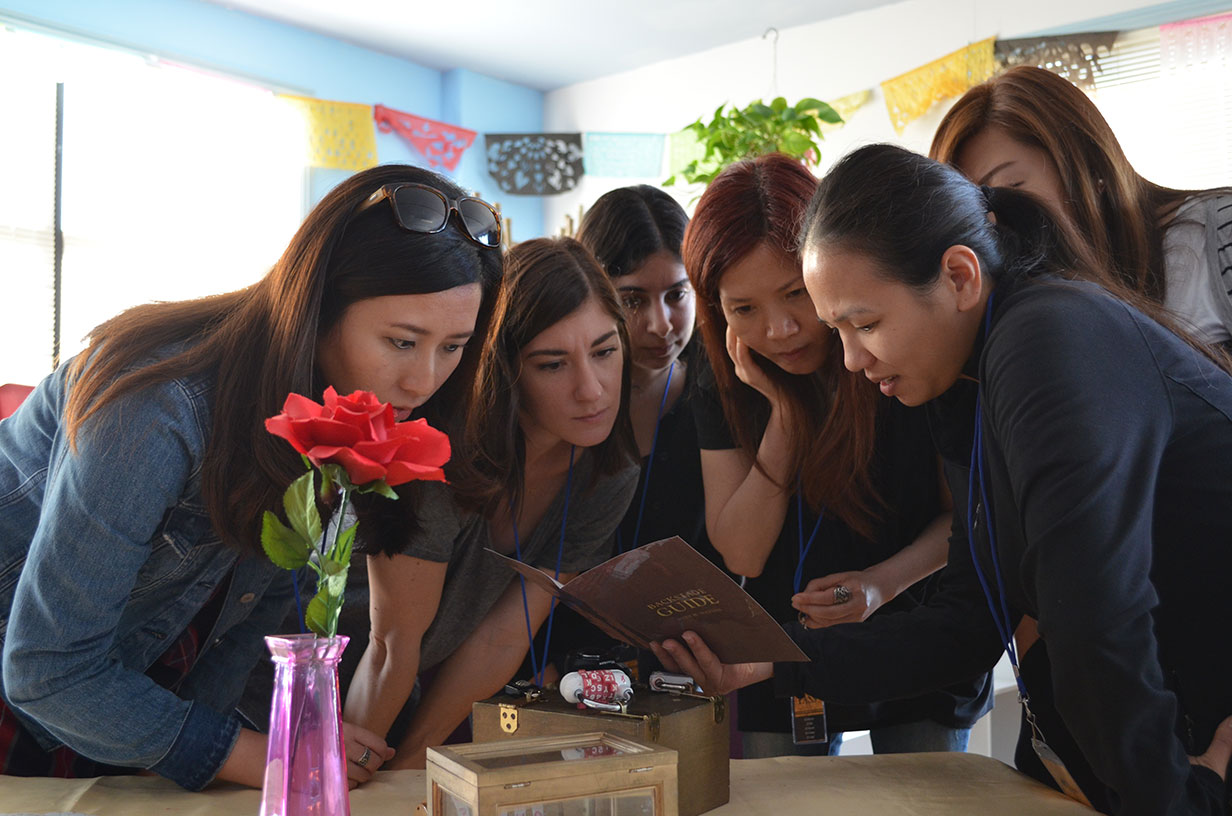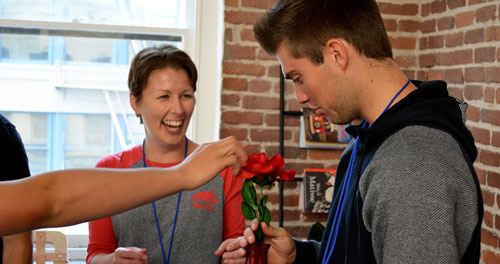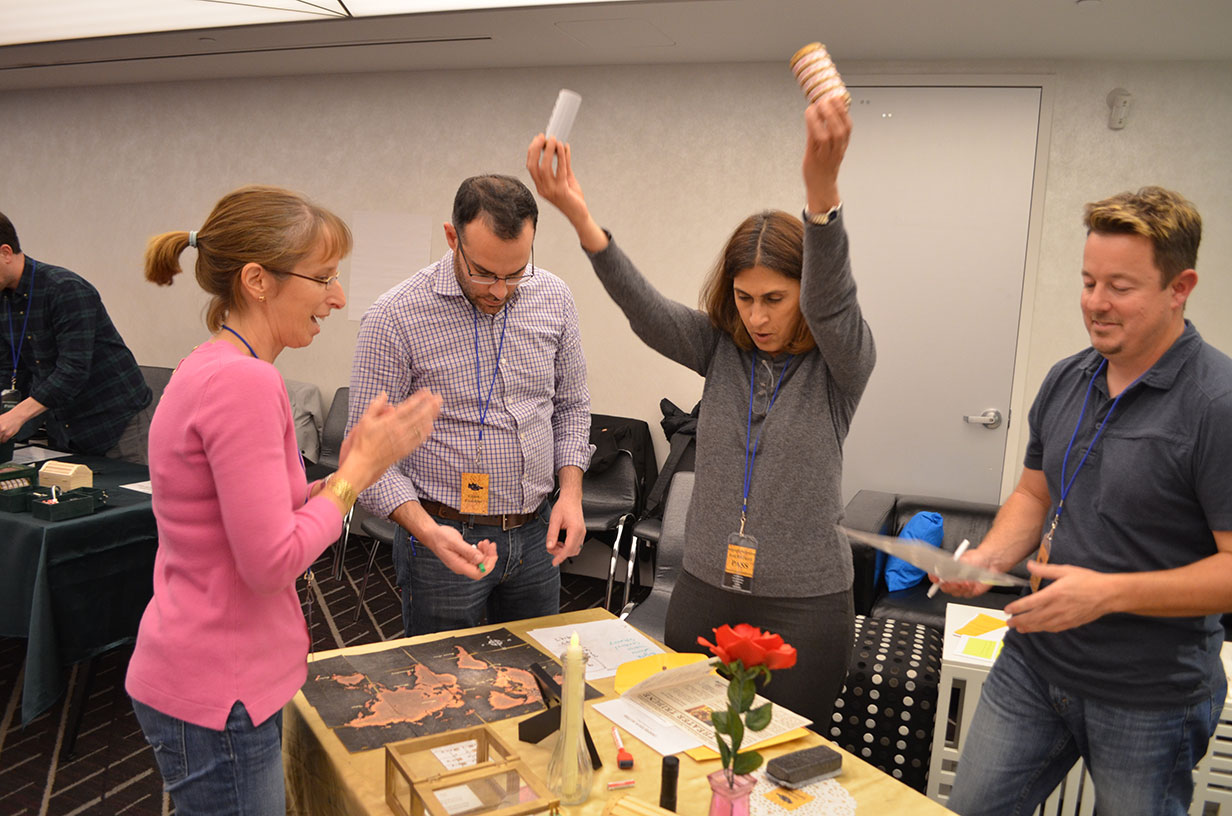
Why Problem Solving Based Activities Are Great For Team Building
Table of Contents
- Remember When Problem-Solving Was Play?
- The Many Benefits of Problem-Solving
- Use Your Whole Brain and Co-Create a Novel Solution With Your Teammates
- Practice Trust By Taking Risks Together
- Challenge Creates Connection – But It Doesn’t Have To Be Painful
- Problem-Solving Is Relevant To Your Workplace And Your Everyday Life
- Looking To Build A Culture of Problem Solving With Your Team?
Remember When Problem-Solving Was Play?
 What factors caused last quarters’ financial downturn? Who’s bringing what to your work anniversary potluck? How many vacation days do I have left again? Often as adults, our minds are churning out solutions to mundane problems of various shapes and sizes all day long. We think a chance to let loose means the opportunity to shut off our mental efforts as much as possible.
What factors caused last quarters’ financial downturn? Who’s bringing what to your work anniversary potluck? How many vacation days do I have left again? Often as adults, our minds are churning out solutions to mundane problems of various shapes and sizes all day long. We think a chance to let loose means the opportunity to shut off our mental efforts as much as possible.
But remember when problem-solving was play? Games like Clue, logic grids, and BrainQuest provided an exciting venue to utilize our minds in new and creative ways. If those games were fun then, why can’t we enjoy them now? We can! Challenging our brains is still a great way to enjoy ourselves, continue learning, and get to know the people around us. Let’s bring back the days where we got to use our brains for fun!
The Many Benefits of Problem-Solving
Problem solving games are unique group activities that expand the mind and transport you to the puzzle world. They can highlight the diversity of thinking within your team and reward everyone for their efforts. For your team of endearing engineers, they can put every individual in their element, while encouraging new social bonds; for your team of talkative teachers, they can stretch their ways of thinking and spark delight in creative thought process. For everyone in between, these types of games are not only engaging, but a unique place to shine.
Use Your Whole Brain and Co-Create a Novel Solution With Your Teammates
 In a gamified context, problem solving is more than analytical. We may not be the next Michaelangelos, but both right brain and left brain light up in order to make novel connections and dream up a solution that is yet unknown. This is not the same as solving a simple math problem, it is a genuine creative process. And when we engage with this process as a team, we further generate a shared experience to which each person has contributed meaningfully. If the team had been different – so the problem-solving process itself would have been different.
In a gamified context, problem solving is more than analytical. We may not be the next Michaelangelos, but both right brain and left brain light up in order to make novel connections and dream up a solution that is yet unknown. This is not the same as solving a simple math problem, it is a genuine creative process. And when we engage with this process as a team, we further generate a shared experience to which each person has contributed meaningfully. If the team had been different – so the problem-solving process itself would have been different.
Practice Trust By Taking Risks Together
Unlike a group activity that relies primarily on following directions, there is no step by step guide with problem-solving games. This means you have to take risks: you might propose an idea that’s not quite right, you might trust a teammate who shows up with new information or a whacky solution. And risk-taking releases neuro-chemicals that encourage interpersonal connection as well! You may still be in your office, but you are truly in the wilderness of mental space.
Challenge Creates Connection – But It Doesn’t Have To Be Painful
Speaking of wilderness, in the outdoor industry, people often reference something they call “Type II fun”. Type II fun is the sense of satisfaction, fulfillment, connection, and – believe it or not – fun, that is often experienced when reflecting on a challenging experience that was successfully overcome.
Remember that time you got stuck in a snowstorm on your way home from a ski trip in college and Alex really had to pee and Sam lost their left glove and kept joking about getting frost-bite, but somehow under all the luggage you not only found your tire chains but also miraculously remembered how to put them on and Sam somehow maintained full function of all fingers? When you finally made it home you probably made some hot chocolate and couldn’t wait to fall asleep but first stayed up laughing about it all saying, “10/10 would do again”.
 You’re not alone. Plentiful research from HBR, Psychological Science, and academic sources shows that challenging experiences create meaning, and that these experiences, when shared, spark lasting bonds. So team building that includes challenge – like a good problem-solving game – is more likely to provide a sense of accomplishment and a sense of camaraderie than your average night out. And luckily, we can do it with a little more mental engagement and a lot less physical discomfort than your average outdoor expedition!
You’re not alone. Plentiful research from HBR, Psychological Science, and academic sources shows that challenging experiences create meaning, and that these experiences, when shared, spark lasting bonds. So team building that includes challenge – like a good problem-solving game – is more likely to provide a sense of accomplishment and a sense of camaraderie than your average night out. And luckily, we can do it with a little more mental engagement and a lot less physical discomfort than your average outdoor expedition!
Problem-Solving Is Relevant To Your Workplace And Your Everyday Life
Finally, problem-solving is a process that is endemic to the workplace. It illuminates both team dynamics and the individual. You might learn that someone has a niche skill set or a unique way of thinking. The puzzle itself, and each person’s approach to solving it, is guaranteed to teach you something new and exciting. Not to mention, every time you solve something, you get that little boost of self-confidence and celebration.
Real life requires the ability to work together with other people and solve complex problems at the same time. Problem solving games allow you to practice this fundamental skill, identify your strengths and the strengths of others, and reflect on where you and your team have room to grow – all while having fun!
Looking To Build A Culture of Problem Solving With Your Team?
There are plenty of benefits to the social, physical, philanthropic, and other types of events your team has likely hosted in the past. Buy why not mix it up to add something new to your next outing? An activity rooted in creative problem solving will be fun and constructive for your entire team.
BreakoutIQ specializes in these kinds of activities, offering:
- Large group, pop up escape rooms
- Custom trivia activities
- Outdoor scavenger hunts that can also be customized by location or company
- Optional team workshops and debriefs to further enhance the team activity learnings and takeaways
If you’re interested in booking an event with us, please visit our home page or click the “Contact Us” button on the top of your screen!
We hope you’ll join us soon!
